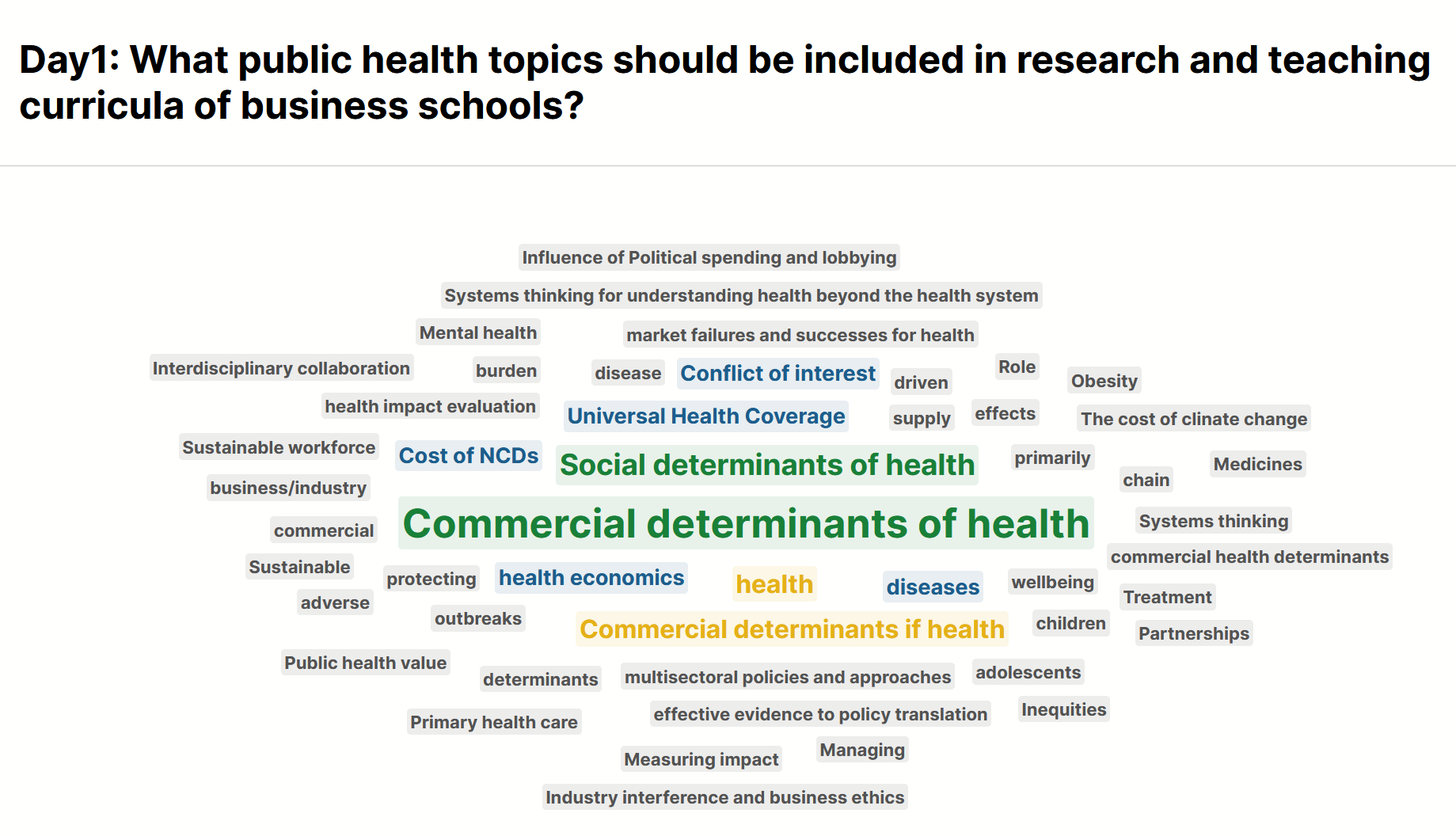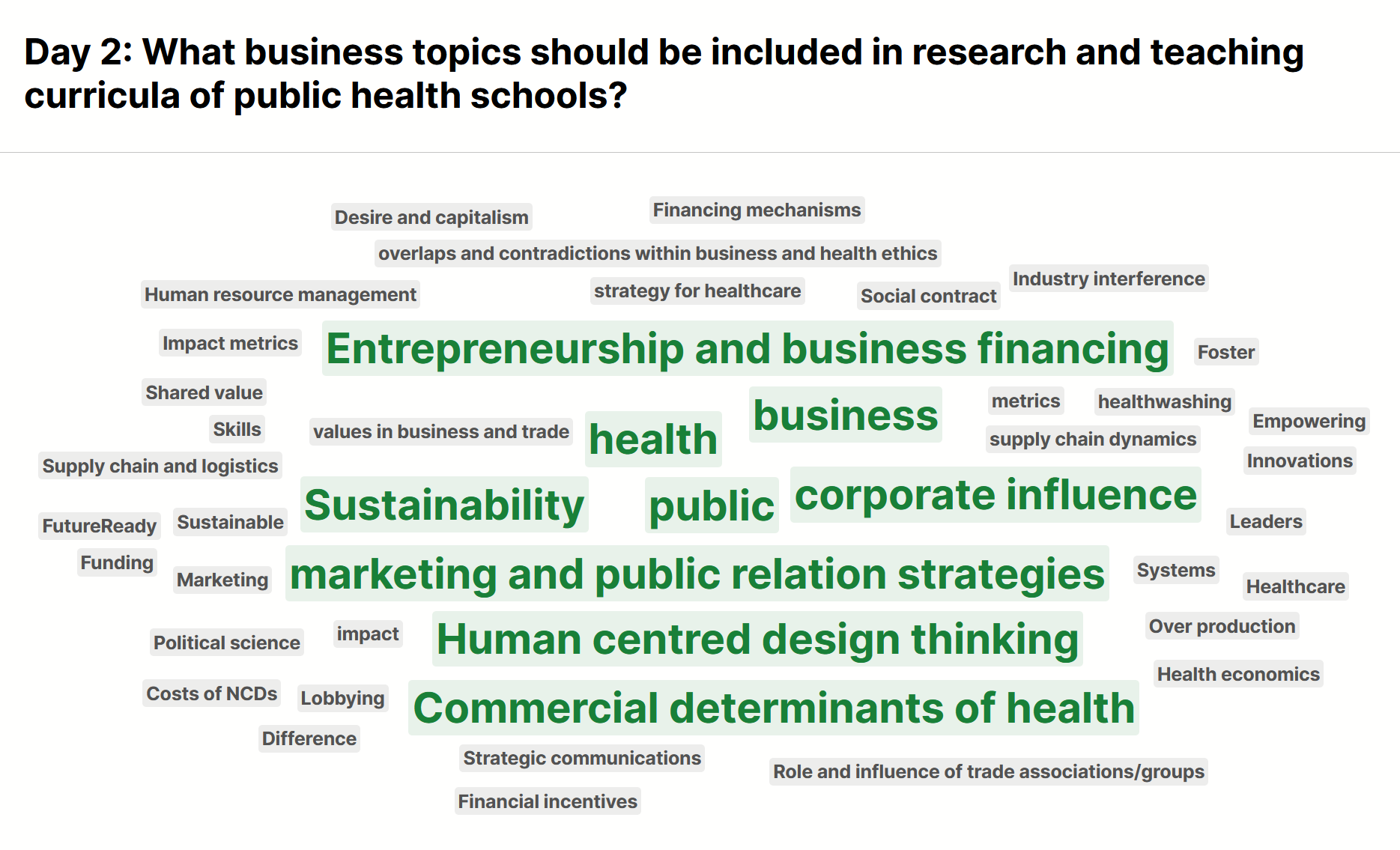World Health Organization
From Mandate to Implementation: Operationalizing National Multisectoral Governance for NCDs in Kuwait
Multisectoral Action
17 Dec 2025
World Health Organization | 15 Apr 2025
At the first dialogue on business and public health convergence, deans, directors and senior faculty of business and public health schools met with business leaders and global health experts to explore research, teaching and leadership that can transform the economic, commercial, environmental and social determinants of noncommunicable diseases (NCDs).
As the leading cause of death and disability worldwide, NCDs – including cardiovascular diseases, cancer, chronic respiratory diseases, diabetes, and other conditions – also cause staggering economic losses and socioeconomic challenges. Health and health inequity are directly relevant to business, influencing economic development, market performance, and workforce productivity.
Business practices in turn are are among the structural drivers of health: they shape people’s living conditions and accelerate technological innovation, yet risk harming health through marketing of unhealthy products or by destroying living environments and social infrastructure.
Business and public health schools are in a prime position to re-image traditional concepts of business and health and form and inspire a new generation of researchers, lecturers and leaders that effectively applies interdisciplinary thinking towards supporting both sustainable health and business practices. The first dialogue on Business for Health convened participants from more than 60 countries with WHO technical experts for thematic discussions on 27 and 28 March 2025.

Collaborative word cloud on including public health topics topics in business school curricula.
The dialogue was co-organized by the Global Coordination Mechanism on NCDs and the Economics and Commercial Determinants programme of work ( at the World Health Organization (WHO), and the School of Public Health at the Washington University. Sandro Galea, the Margaret C. Ryan Dean of WashU School of Public Health, and Michael Mazzeo, the dean of WashU Olin Business School, moderated dedicated panels reflecting on business and health with a focus on their respective disciplines.

Participants at the first dialogue with deans and directors of public health and business schools on preventing and managing NCDs
On both days, panelists and participants called for a more interdisciplinary approach to research and teaching in business and public health. In understanding and addressing the commercial and social determinants of health, for example, market dynamics and marketing theory or social responsibility and accountability principles hold key insights and pathways for action.
“Health system and healthcare management have become an increasingly relevant topic in business school curricula: medical information systems and innovation in digital health, diverse cost of care models around the world, supply chain management and procurement strategies are all areas where business intelligence and expertise can have a direct impact on health outcomes.”
Alexander Triantis, Dean of Carey Business School, Johns Hopkins University
Facilitating the interdisciplinary perspective, however, may require shifting from the traditional, profit-orientated business narrative to a stronger committed to health and social impact. A guiding question should be how health and well-being can be profitable for all. Multiple existing concepts and frameworks in business and public health offer opportunities to test and advance more interdisciplinary collaboration, for example in the areas of structural determinants of health, design thinking, health system management, or information systems.
While often perceived as a challenge, the tension between public sector regulation and competitive business practice can be productive for both sectors, participants highlighted. Addressing asymmetric information between companies and consumers, regulation also ensures a level playing field, competition, and equal market access as business opportunities for companies.
“In business, health impact could be a big differentiator in competition, innovation and in aligning incentives. Public health could learn a lot from market dynamics, marketing theory, and consumer profiles. Multidisciplinary thinking between public health and business schools is hence truly powerful.”
Nason Maani, University of Edinburgh, School of Social and Political Science
Mutual trust in each others’ commitment to drive positive health and social outcomes remains a fundamental success factor – both among researchers and scholars in business and public health and between public and private sector actors looking to collaborate as part of their work. Private sector actors should be engaged in a meaningful way in business and in public health schools, to generate research and teaching ideas that are helpful to all, while safeguarding public health from undue influence and conflicts of interest.
As major power imbalances – including between major global corporations and small developing states – coin global public health and business landscapes. The dialogue also stressed the need for a critical look at concepts of the business value chain, shareholder primacy, and equitable access to resources.
At universities and through our interdisciplinary business curricula, we offer students a unique, protected space to deconstruct and critically reflect the history and power anatomy of profitability. It is in this space we are able to question personal attraction and concepts of profit – and shift them to include health and social objectives. Business Schools must study the systems of overproduction as much as over consumption.
Norah Campbell, Associate Professor, Trinity Business School
In business practice, health could be considered as a strategic investment with benefits for companies, workforce and consumers. In practice, however, company incentives are often misaligned and rarely reward efforts that promote positive health and social impact. For business schools, educational accreditation can facilitate the inclusion of a strong impact at institutional level and send a strong signal to students and future leaders.

Collaborative word cloud on including business topics in public health school curricula.
Participants also affirmed the important role WHO and multilateral partners has to play in setting evidence-based norms and standards, and convening a continuous, global and multisectoral exchange across disciplines and actors.
Insights from the dialogue will be presented at the Second General Meeting of the WHO Global Coordination Mechanism on NCDs (GCM/NCD), and support advocacy efforts towards the Fourth High-level Meeting of the United Nations General Assembly on the Prevention and Control of Non-Communicable Diseases and the Promotion of Mental Health and Well-being (UNHLM4) t be held in New York in September 2025.